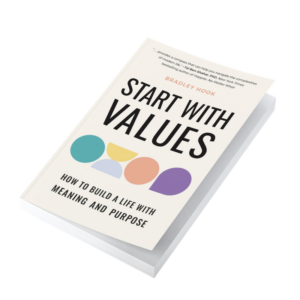
Our Founder

Writer, speaker and entrepreneur, Brad Hook, established The Values Institute as a way to lay the groundwork for his forthcoming book Start With Values, slated for release in late 2024.
Start With Values is more than a companion to a book; it’s a living, evolving initiative that aspires to be the world’s premier content repository for human core values.
Our Purpose
At the heart of Start With Values is a simple yet profound purpose: to uplift the human experience and increase fulfillment by promoting values-aligned actions.
We are not just about temporary relief or fleeting success; we aim to bring about lasting change by focusing on what truly matters—core values.
Our Mission
Our mission is to enable positive action—aligned with core values—from the ground up and the top down. We know that most people are kind, compassionate, and collaborative. Yet, many people’s values are compromised by power, fame, authority, and self-interest. It shouldn’t be the rare leader who has integrity. We should all start with our values and live accordingly. The values may differ but at least we’ll know why.
We believe that each individual’s journey towards values alignment is a step forward in creating a world imbued with tolerance, respect, and kindness.
Our Vision
We envision a world where core values are not just principles written on a page but a lived experience, promoting tolerance, respect, and kindness for oneself, others, and the planet.
Our Values
We operate under three guiding values: Innovation, Kindness, and Creativity. These values inform every piece of research, article, and tool we share with our community.
What Sets Us Apart
Start With Values (the Values Institute) stands out for its multidisciplinary approach. We merge insights from neuroscience, philosophy, psychology, evolutionary biology, and more to offer a comprehensive framework for personal and collective flourishing. By integrating these diverse fields, we present a modern, updated framework for understanding and implementing core values in daily life.
Why Core Values?
Why do core values matter? They serve as a personal compass for success, a metric for well-being, and a framework for spiritual development. By regularly affirming your core values, you not only cope better with stress but also turn even the most mundane tasks into deeply fulfilling experiences.
Participants who affirmed their values had significantly lower cortisol responses to stress, compared with control participants.
Affirmation of Personal Values Buffers Neuroendocrine and Psychological Stress Responses. University of California.
Much has been written about “stress management” techniques that are primarily behavioral in nature — such as getting adequate sleep, regular exercise, and mental downtime; taking vacation; doing controlled breathing; practicing yoga or mindfulness meditation; or getting acupuncture treatments. But relatively little has been written recently on the benefits of self-disciplined articulation of a philosophical worldview and core values that help us weather the storms and devastations that inevitably rock our lives and careers.
David Brendel, MD, PhD, Harvard Business Review
It turns out that writing about your values is one of the most effective psychological interventions ever studied. In the short term, writing about personal values makes people feel more powerful, in control, proud, and strong. It also makes them feel more loving, connected, and empathetic toward others. It increases pain tolerance, enhances self-control, and reduces unhelpful rumination after a stressful experience.
In the long term, writing about values has been shown to boost GPAs, reduce doctor visits, improve mental health, and help with everything from weight loss to quitting smoking and reducing drinking. It helps people persevere in the face of discrimination and reduces self-handicapping. In many cases, these benefits are a result of a one-time mindset intervention. People who write about their values once, for ten minutes, show benefits months or even years later.
Professor Kelly McGonigal, Stanford University

